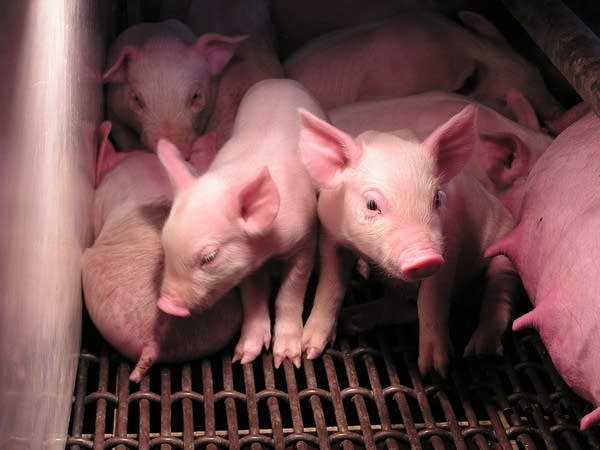Hog producers losing money
Go Deeper.
Create an account or log in to save stories.
Like this?
Thanks for liking this story! We have added it to a list of your favorite stories.

Sitting at his dining room table, John Vaubel eyes some worksheets scattered across the shiny wood surface. The words and numbers scrawled on the paper sum up the state of the business for this southern Minnesota hog producer.
"The economics are pretty ugly," says Vaubel. "We're probably losing at least $35 a pig, maybe $40." His family operation, near Mapleton in southern Minnesota, sells roughly 40,000 hogs a year. Things may change, but for a large producer like Vaubel, losses could top $1 million this year if the current low prices persist.
"The feed cost is the real problem," says Vaubel.

On one worksheet, the word "corn" is underlined. Corn prices have more than doubled in the last year and a half. The price of soybean meal has also gone up. In all, Vaubel figures his feed costs per animal have risen about one-third.
Turn Up Your Support
MPR News helps you turn down the noise and build shared understanding. Turn up your support for this public resource and keep trusted journalism accessible to all.
"This is my livelihood," says Vaubel. "We're in the barn with the moms and the little babies, one-week-old babies."
Standing in one of his hog barns, Vaubel says it will take a while before he starts making money again.
To make matters worse, high fuel prices have doubled the cost of transporting his pigs to a meatpacker. The hogs in this barn are headed to market next summer. By then, Vaubel thinks he might get a better price for the animals.
"Traditionally the summer markets are a little better," says Vaubel. "I'm hopeful that these might break even, at best."
"The economics are pretty ugly. We're probably losing at least $35 a pig, maybe $40."
That's the kind of hope a lot of hog producers are carrying with them these days.
University of Missouri agricultural economist Ron Plain says it looks like the nation's hog producers will operate at a loss for most of 2008. Ironically, he traces the origins of the problem to a long run of good years.
"By and large, 2005, 2006 and early 2007 were profitable years," says Plain. "For hog producers, that has led to an increase in hog numbers, which pushes hog prices down."
Plain says the main reason for the sharply higher feed costs is the growing ethanol industry. He says it's demanding so much corn that the price of that grain has more than doubled.
Even the big meat processors are feeling the pain. The nation's largest pork company, Smithfield Foods, says it's hog raising costs have risen more than 20 percent in the last year. Consumers are expected to eventually pay that bill in the form of higher grocery store pork prices.
Agricultural economist Ron Plain says the hog losses are so severe that some operations won't make it.

"Producers can only stand losing money so long, and we will cut back production," says Plain. "Part of the cutback will be by producers staying in business, but producing fewer hogs. Also part of the cutback will come from producers who decide that they don't want to do this anymore. So there will be a number of hog farms that have been producing hogs that won't be a year from now."
Southern Minnesota hog producer John Vaubel expects to be among the group that survives. But he may trim hog production as much as 15 percent.
One thing helping Vaubel is that he grows about half the corn he needs. A change in the price of that grain would be a big help, but Vaubel says that's unlikely.
"I don't think so," says Vaubel. "Not with the rampant growth of ethanol plants."
Vaubel thinks it's time to slow down the ethanol industry. He says one practical step he'd like to see is to end the 51-cent-a-gallon federal subsidy for the fuel.
"It's really unfair competition to the livestock industry," says Vaubel.
Vaubel says he's not opposed to ethanol. In fact, he's even invested in a plant. But he thinks the ethanol industry is so overheated it's threatening the future of thousands of livestock producers -- not just hog farmers, but also cattle ranchers and poultry producers.
Vaubel says it's time to adjust course before some of those farmers are forced out of business.




